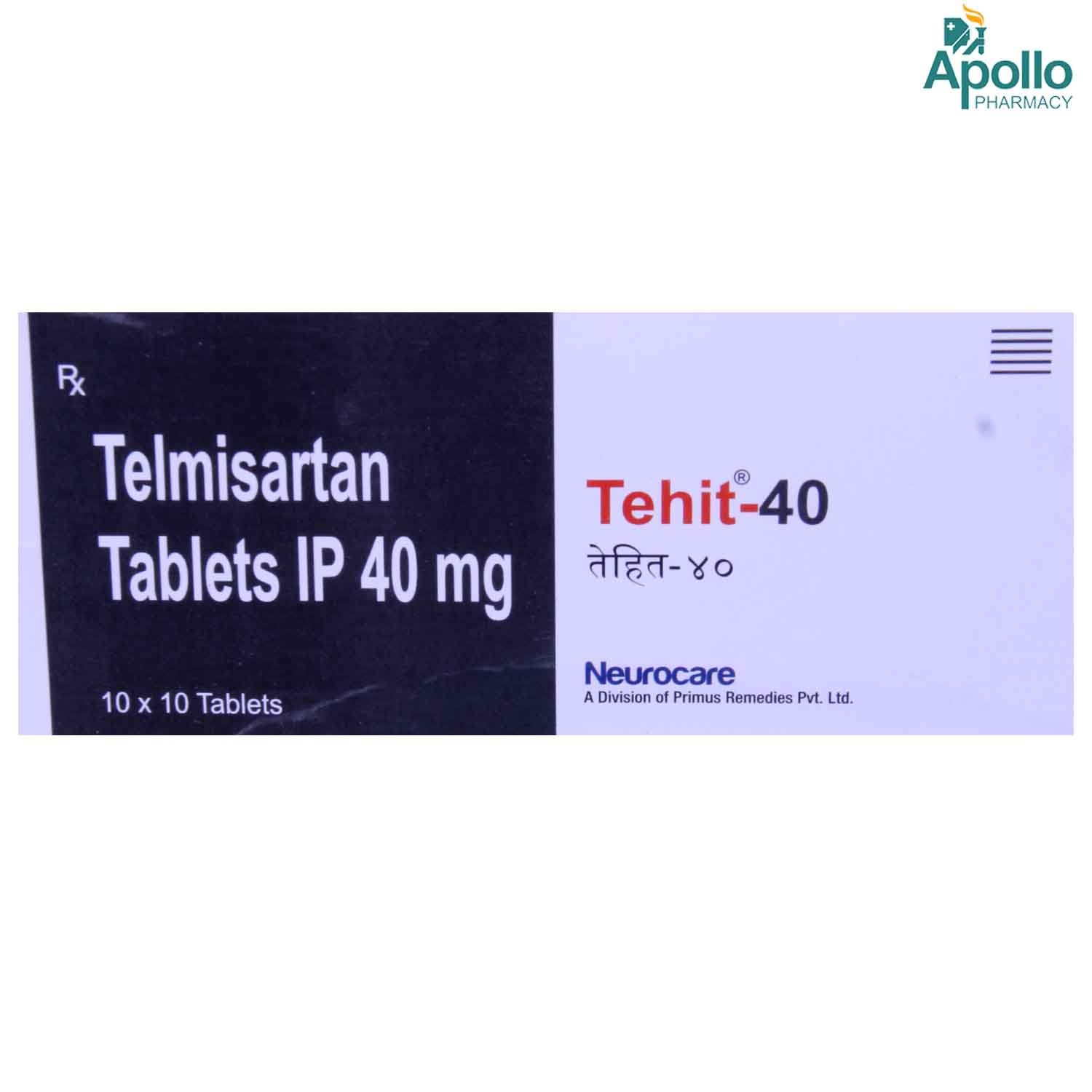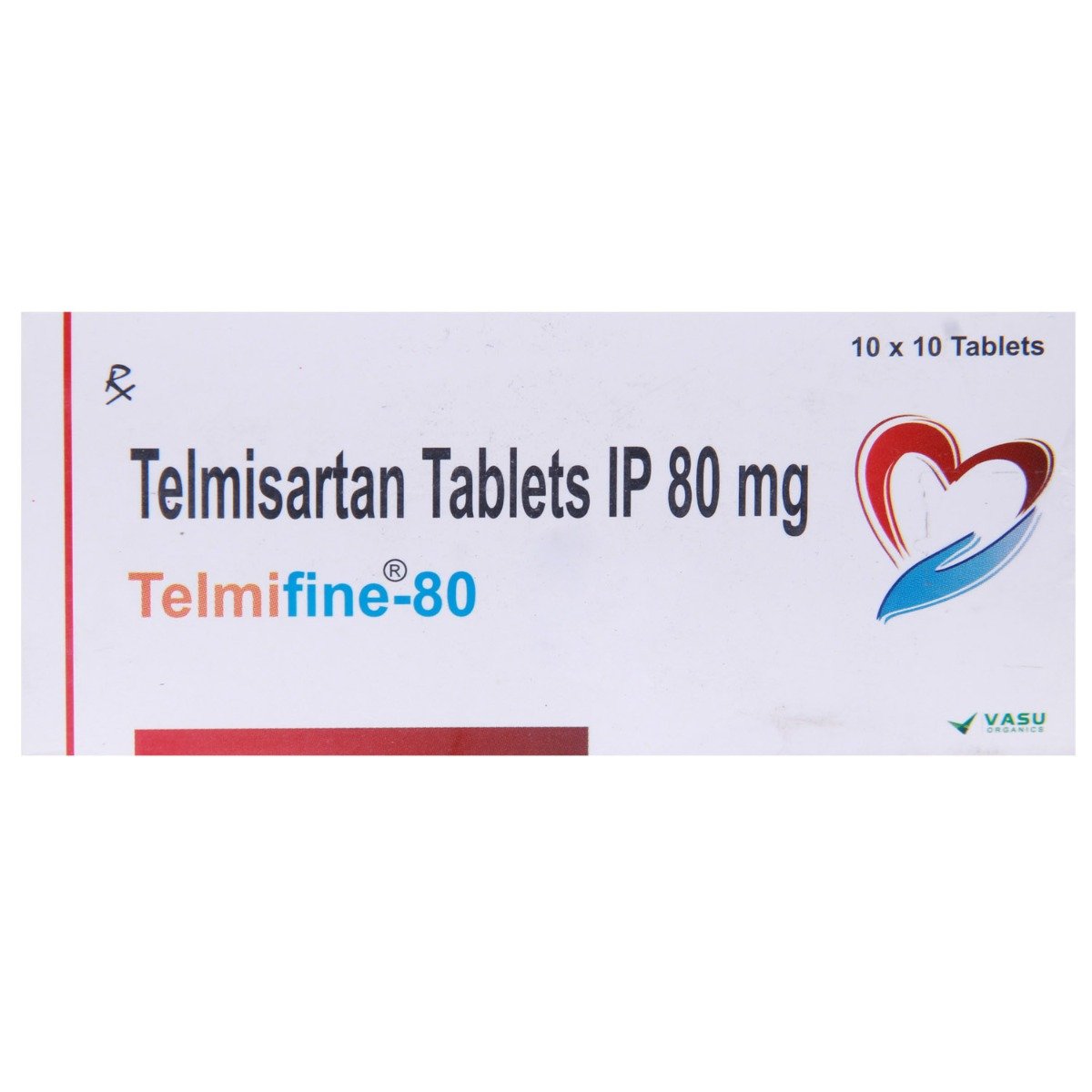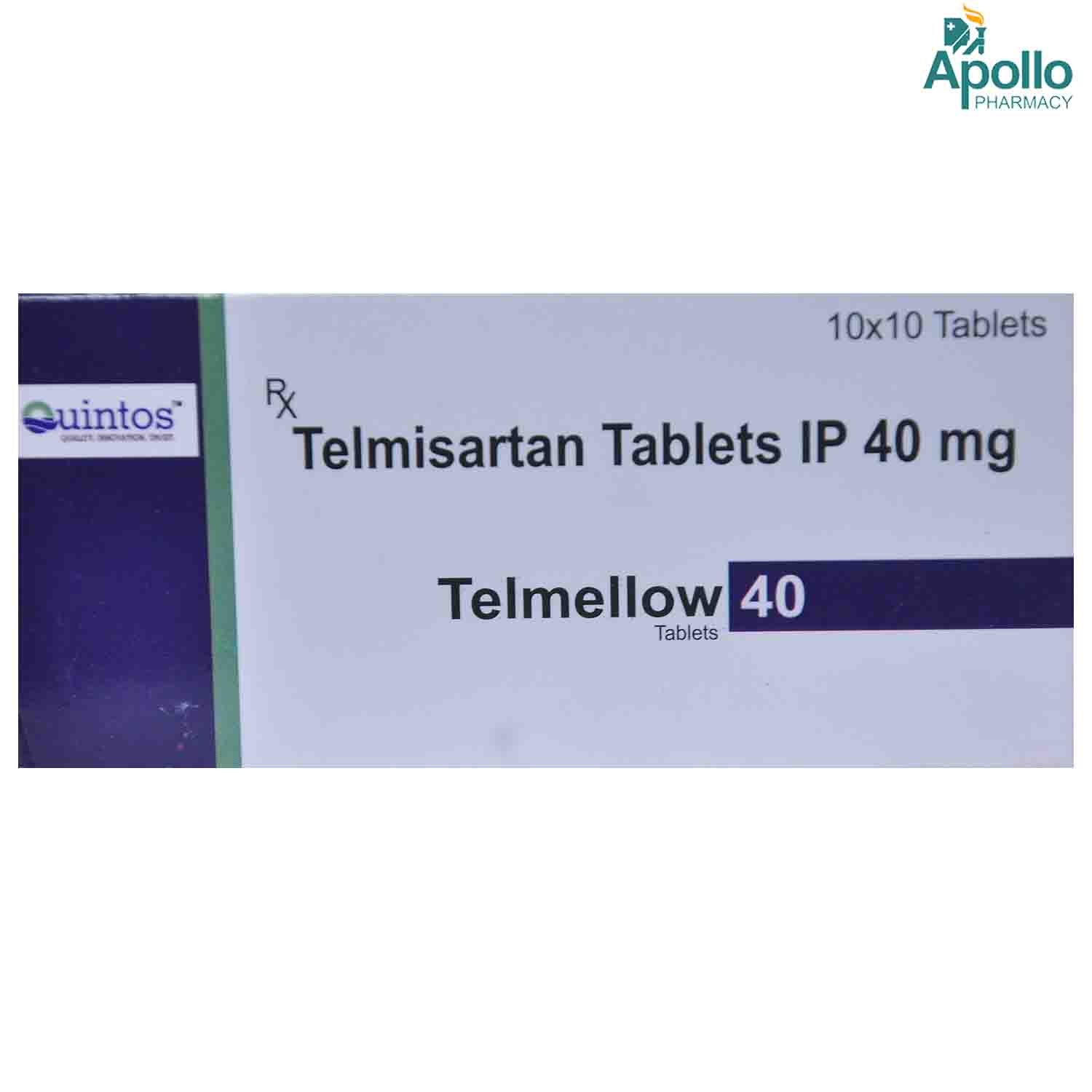Telmisartan
About Telmisartan
Telmisartan is used to treat hypertension (high blood pressure) and to reduce the risk of heart attack or stroke in adults. Hypertension is a medical condition in which the blood pressure is elevated persistently in the arteries without any known cause.
Telmisartan contains Telmisartan, which works by blocking the action of a hormone called angiotensin II in the body. This hormone causes blood vessels to narrow, leading to high blood pressure. By blocking this action, Telmisartan widens and relaxes blood vessels, lowering high blood pressure.
In some cases, Telmisartan may cause side effects like diarrhoea, sinus infection, and back pain. Most of the side effects do not require medical attention and usually resolve on their own over time. However, if the side effects persist, please consult your doctor.
Do not take Telmisartan if you are allergic to any of its components. Telmisartan is not recommended for use during pregnancy, breastfeeding, and in children. This medicine may cause dizziness and lightheadedness; hence, drive only if you are alert. Keep the doctor informed about your medications and medical conditions to prevent any interactions.
Uses of Telmisartan
• Hypertension Management: It helps reduce and maintain ideal blood pressure levels and is primarily used to treat high blood pressure.
• Treatment for Heart Failure: Patients with heart failure may be prescribed Telmisartan to enhance heart function and lessen symptoms.
• Post-Heart Attack Therapy: This medication may be recommended following a heart attack in order to promote healing and avert further cardiovascular incidents.
• Stroke Prevention: Patients with a history of hypertension or cardiovascular problems may benefit from the medication's ability to lower their risk of stroke.
Medicinal Benefits
- Telmisartan belongs to a class of medicines known as angiotensin II receptor blockers (ARBs), commonly used to manage high blood pressure (hypertension). It relaxes the blood vessels, allowing blood to flow more easily and reducing the workload on the heart.
- By lowering blood pressure, Telmisartan helps reduce the risk of serious cardiovascular complications such as heart attack and stroke.
- Additionally, Telmisartan is prescribed to lower the risk of cardiovascular (CV) events, including heart attack, stroke, or cardiovascular death, in individuals aged 55 and above who have risk factors like diabetes, high cholesterol, or a history of smoking.
- It is also a preferred option for patients who are unable to tolerate ACE inhibitors, offering similar heart-protective benefits.
Directions for Use
- Telmisartan can be taken with or without food, as advised by the doctor.
- Follow your doctor's instructions regarding the dosage and timing of the medication for better effectiveness.
- Swallow Telmisartan as a whole with a glass of water.
- Do not crush, chew, or break it.
Storage
Side Effects of Telmisartan
- Diarrhoea
- Sinus infection
- Back pain
Drug Warnings
- Do not take Telmisartan if you are allergic to any of its components.
- Inform your doctor if you have diabetes, liver, kidney or heart problems.
- Avoid taking Telmisartan if you are pregnant or breastfeeding. Consult your doctor if you are pregnant, think you may be pregnant or plan to become pregnant. Your doctor will prescribe a safer medicine to use during pregnancy.
- Avoid potassium supplements with Telmisartan, as they may lead to high blood potassium levels. Your doctor may recommend that you check your potassium level regularly.
- Telmisartan may cause sleepiness, dizziness, lightheadedness, or fainting; use caution when engaging in activities such as driving a car or operating appliances or machinery. Do not consume alcohol with Telmisartan as it may increase the risk of low blood pressure.
Drug Interactions
Drug-Drug Interaction: Telmisartan may have interaction with pain killers (ibuprofen, aspirin), blood thinners (heparin), medicines used to treat heart problems (digoxin), high blood pressure-lowering medicines (lisinopril, enalapril, ramipril, benazepril, captopril, fosinopril, moexipril, perindopril, quinapril, trandolapril, enalaprilat, aliskiren), water pills (amiloride, spironolactone, triamterene), muscle relaxant (tizanidine), antibiotics (trimethoprim), and potassium supplements.
Drug-Food Interaction: Telmisartan may interact with potassium salt substitutes and potassium supplements, potentially leading to hyperkalemia (high levels of potassium in the blood). This may cause severe adverse effects, such as irregular heartbeat, muscle paralysis, and kidney failure. Do not take potassium supplements or use salt substitutes unless your doctor has instructed you to do so.
Drug-Disease Interaction: People with diabetes, cholestasis (liver disease due to the blocked flow of bile), or impaired kidney function should consult a doctor before taking Telmisartan.
Drug-Drug Interactions Checker List:
Safety Advice

Alcohol
unsafeYou are recommended to avoid consumption of alcohol with Telmisartan as it may increase the risk of low blood pressure and cause adverse effects such as dizziness, fainting, light-headedness or headache.

Pregnancy
unsafeTelmisartan is a Category D pregnancy drug and is considered unsafe for pregnant women, especially in the second and third trimesters, as it may cause death of the unborn baby.

Breast Feeding
cautionAvoid breastfeeding while taking Telmisartan as it may be unsafe for the baby.

Driving
cautionTelmisartan may cause dizziness, lightheadedness or tiredness in some people. So, use caution before driving or operating machinery.

Liver
cautionTake Telmisartan with caution, especially if you have a history of liver diseases/conditions. Your doctor may adjust the dose as required. Telmisartan is not recommended for patients with severe liver disease.

Kidney
cautionTake Telmisartan with caution, especially if you have a history of kidney diseases/conditions. Your doctor may adjust the dose as required.

Children
unsafeIt is not recommended for children below 12 years as the safety and effectiveness in children are not established.
Habit Forming
Diet & Lifestyle Advise
- Maintain a low-sodium diet and avoid processed foods, which often contain high amounts of sodium. Try replacing salt with spices or herbs to add flavour to your food.
- Regular exercise, such as cycling, walking, jogging, dancing, or swimming, should be done for a minimum of 30 minutes a day.
- Chronic stress can also lead to high blood pressure. Therefore, avoid stress by adjusting your expectations, learning to react differently in certain situations, and making time for activities you enjoy.
- Maintain a diet that is rich in fruits, vegetables, whole grains, and low-fat dairy products.
- Avoid smoking and alcohol intake.
Special Advise
- Monitor your blood pressure regularly, and if you notice any fluctuations, please consult a doctor.
- Avoid getting up too fast from a sitting or lying position, or you may feel dizzy.
Patients Concern
Disease/Condition Glossary
High Blood Pressure (Hypertension): When blood pressure rises, too much force is exerted on the lining of the arteries, causing the heart to work harder to pump blood throughout the body. This results in damage to the blood vessels. If high blood pressure is left untreated, it can lead to stroke, heart attack, heart failure, kidney failure, and eye problems.
Cardiovascular risk: It is usually diagnosed in patients older than 55 years of age and is characterised by blood vessel disease in the heart, brain, or legs (coronary, peripheral, or cerebral vascular disease) or diabetes with organ damage.
FAQs
Telmisartan is used to treat hypertension (high blood pressure) and to reduce the risk of heart attack or stroke in adults.
No, you are not recommended to take Telmisartan with antidepressants or barbiturates as it may cause dizziness. However, please consult your doctor before taking Telmisartan with any other medicines.
Telmisartan contains Telmisartan, which works by blocking the action of a hormone called angiotensin II in the body. This hormone causes blood vessels to narrow, leading to high blood pressure. By blocking this action, Telmisartan widens and relaxes blood vessels, lowering high blood pressure.
Telmisartan may increase potassium levels in the blood (hyperkalemia). Therefore, it is recommended to avoid potassium supplements and foods that are rich in potassium, such as coconut water, bananas, and broccoli.
No, Telmisartan is not recommended for use during pregnancy, especially in the second and third trimesters, as it may harm the developing baby. Therefore, if you are pregnant or planning pregnancy, please inform your doctor before taking Telmisartan.
You are not recommended to take more than the prescribed dose of Telmisartan as it may cause an overdose resulting in symptoms such as dizziness, low blood pressure, and a fast or slow heartbeat. However, if you experience any of these symptoms while taking Telmisartan, please consult a doctor immediately.
No, you are not recommended to take ibuprofen with Telmisartan as co-administration of these two medicines may reduce the effect of Telmisartan and increase the risk of impaired kidney function. However, if you experience loss of appetite, sudden weight loss or weight gain, weakness, muscle cramps, vomiting, nausea, decreased or increased urination, irregular heart rhythm and fluid retention, please consult a doctor immediately. If you are supposed to use these medicines together, you should contact your doctor to adjust the dose to be used safely.
Telmisartan should be taken as advised by the doctor. It is better to take it at the same time daily as it will help you remember to take the medicine.
Your blood pressure may be decreased during the first 2 weeks of treatment. However, it might take 4 weeks for you to notice the full benefit of Telmisartan.
Telmisartan should not be discontinued without a doctor's consultation as stopping Telmisartan may cause blood pressure to return to pre-treatment levels within a few days. Therefore, continue taking Telmisartan even if you feel well. Consult the doctor if you have any concerns.
Before starting Telmisartan inform the doctor if you have kidney problems as it might worsen the condition. You may need a lower dose in such cases. Consult the doctor if you notice unexplained weight gain or swelling in the hands, feet or ankles.
Do not worry as Telmisartan may not cause weight gain. However, consult the doctor if you notice unexplained weight gain as it could be a sign of kidney problems.
Telmisartan might lower blood glucose levels. Therefore, inform the doctor if you have diabetes. Regular monitoring of blood sugar levels is advised.
Yes, Telmisartan may cause hyperkalemia (high potassium level in blood). The doctor may monitor your potassium levels as needed.
No, Telmisartan does not work by causing excessive urination. It works by relaxing the blood vessels and improving blood flow.
Telmisartan can be taken with or without food.
Side effects of Telmisartan are diarrhoea, sinus infection, back pain, or low blood pressure. Most of these side effects may not require medical attention and resolve over time. However, if the side effects persist, please consult your doctor.
Telmisartan may interact with other medications, particularly NSAIDs (painkillers). Therefore, consult the doctor before taking other medications while on treatment with Telmisartan.
Seek immediate medical attention if you overdose on Telmisartan. Overdose may cause low blood pressure, dizziness and slow/fast heartbeat.





